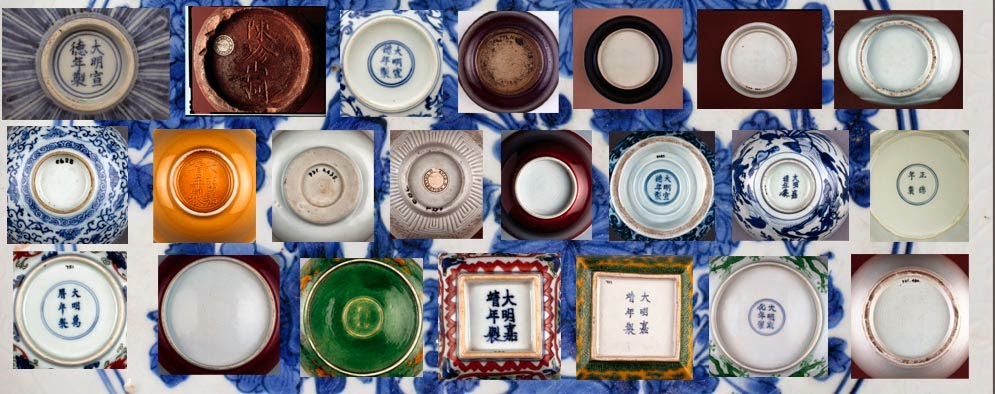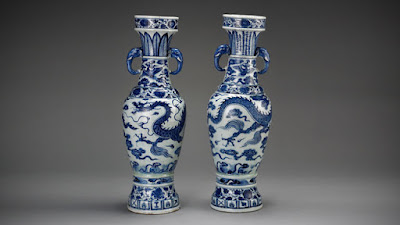Chinese Trade Antiques in New England Estates
Chinese Trade Antiques in New England Estates
Here in New England some of the most interesting collections or accumulations of Chinese and Asian antiques have come to us from family's who had become by default multi-generational collectors or owners of collections through inheritance. While much of it often sits silently in trunks and boxes for decades, quietly tucked away in attics, closets and basements how much of it that is there can be astounding. If this sounds like your situation, be happy, I have good news for you.
A Gift From your Fore-bearers
 |
| 18th C. Blanc De Chine Meiping Vase, North Shore Estate |
It may have been a great grandfather or grandmother who had lived in China while doing Christian missionary work or perhaps as a banker in Hong Kong or Shanghai in the late 1800's, or maybe a relative had a factory in China prior to the political upheavals of the late 19th C. . It could be any number of other things as well, not the least of which a family who had made an initial fortune in The China Trade plying the waters from Salem, Boston, New Bedford, New York or Philadelphia from the early 1800's onward.
Surprisingly Christian missionaries began going into China during the Tang period (7th C. ) under the Nestorian Church from Persia and continued straight through the Ming Dynasty under the direction of the Pope, who sent waves of Jesuits to China. Including among them Mateo Ricci the famed 16th C. Italian mathematician who introduced Western style educational practices to the Chinese. He was later followed during the middle of Qing period circa 1807 with Protestant Missionaries, many from the New England area who continued to go there into the 20th C.. All of these early visitors came home with treasures, if they ever came home at all. Many stayed for the rest of their lives.
Over the last few hundred years tens of thousands of New England families have for one reason or another lived in China and Japan. Some for short periods of time and others for decades. Living in China back "in the day" presented an irresistible urge and attractive opportunity to learn, study and develop an appreciation for objects of the culture. An urge, very few could resist. As a result finding Chinese trade antiques in New England estates is not at all unusual and can have a fascinating history beyond the items themselves.
 |
| Chinese Silk Robe, Maine Estate, Missionary Family |
Who Collected What?
Interestingly we've found Western women from New England would collect often Chinese Robes, textiles and furniture, the husbands would collect porcelains, jades, bamboo and bronzes. If in the China Trade, usually the wives never went along, the husbands would buy a bit of everything to bring home as luxury items for their wives and extended family as gifts. When put together decades or centuries later you can have a visual smorgasbord of interesting things and sometimes of great value, especially today. In some old Yankee family's through marriages, multiple collections became merged over the years, making it even more diverse and at times a bit unwieldy.
 |
| Chinese Famille Rose Plaque |
While a porcelain vase with nice colors is obviously a pleasant thing to own. You now need to know when was it made? is it a rare example worth thousands of dollars or a very nice but typical example and worth hundreds and hundreds of dollars. While 95% fall into the later rather than the former category, it can still add up to a lot of money, especially if you have a few of them. So take your time! Find out if the tales your own family told you were true, very often the family lore is way off the mark and the values are HIGHER than they ever considered possible.
Museums
 |
| 18th C. Chinese jade Incense Burner |
Perhaps you haven't been to either in years, so this is your ideal opportunity to go and have a good visit. The MFA is still FREE after 4:00 PM on Wednesdays. The Peabody Essex Museum is still FREE to all Salem residents! Both are truly great institutions. The Peabody Essex is today one of the greatest Asian art museums in the entire world.
How to Make an Informed Decision about Your Collection
Perhaps we can help. Here at plcombs Asian Art we've been dealers and appraisers of Chinese, Japanese, Korean and Southeast Asian antiques for over 35 years. Located in Gloucester, Massachusetts, we serve all of New England and travel extensively across the country aiding in the evaluation and sale of everything from fine porcelains to silk textiles.
Questions and Answers and Choices
Is what you own really great? Is it an item whose market is limited to the USA or Europe or is it something that has strong appeal directly in Asia? Did you know a lot of important collectors today live in Taiwan? or Johannesburg South Africa? or Australia? Thailand? Hawaii? Well they do and many other places even including Vietnam. The world has changed, we've watched it to our fascination. Today, the largest private collection of Chinese furniture outside of the National Palace Museum is here in the USA, a few years ago the largest collection of Peking Glass was in the Philippines. Lately some of the biggest buyers in Hong Kong have not been only from there and Mainland China.
 |
| Late Ming Dynasty Chinese Bronze Incense Burner |
If you get a bit stuck or simply do not have the time it takes and are really interested tapping into the Chinese or Japanese market in a serious way, call us. Its what we do, every day.
We know values, we know whether you'll do better in a local market or perhaps a swim in the deep end at a major auction house or perhaps straight into Beijing or the Hong Kong market where we've been doing business just fine for decades.
Today Chinese buyers are dominating the market and could easily be the ultimate buyer of what you're selling. While selling something here in Boston may seem like a great idea, you might just be a few too many layers away from the last check written. The buyer in a Boston auction house for example might be three to five people away from the real customer who in the end pays much more dearly to acquire what he or she wants. This is the buyer you should want after all and not a picker from mainland China working with a Credit account who is hitting auctions all over the USA. These buyers are here for a reason, looking for bargains relative to their home market.

Thank you for taking the time to visit, and do feel free to call anytime, even if you just need a quick bit of information to get you started.
Many thanks, Peter Combs
Cape Ann, Gloucester, Mass


Comments
Post a Comment
If you have any questions or comments please send us a message. Or use the Contact Us tab at the top of the page.